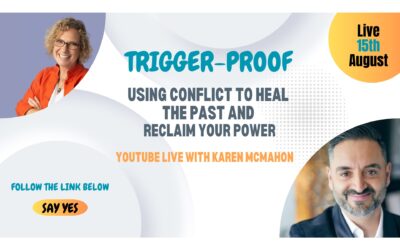"When I'm with her, I want to kill her.
When I'm not with her, all I want to do is be with her."
These words came from a successful lawyer
who runs his own firm—
a man who's excelling in every area of his life except one.
He broke up with his girlfriend months ago
(for the seventh time),
but his body still freezes when he thinks he sees her
on the train platform.
His production at work is suffering.
Panic attacks have become normal.
And despite dating other people,
he can't stop comparing them to her.
If this sounds remotely familiar–
you may find this interesting.
The invisible Prison
What I'm about to share
might be the most important insight
for anyone caught in this painful cycle.
You're not weak.
You're not broken.
And you're not alone.
You're experiencing what psychologists call a trauma bond—
an attachment formed through intense emotional experiences
that creates a powerful connection beyond logic,
reason, or even self-preservation.
I know this terrain intimately.
Not just as a teacher and guide,
but as someone who lived it.
Ten years ago, I was that person—
a successful chiropractor who had it all together on the outside,
yet found myself in a relationship that brought out a side of me
I never knew existed.
I remember staring at my reflection
after a particularly explosive argument,
shocked at who I'd become.
The shame was overwhelming.
"How can I be so smart, so accomplished,
yet so utterly powerless in this relationship?"
Why Willpower Fails
Here's what nobody told me:
You can't think your way out of a trauma bond.
Most approaches to breaking unhealthy attachments
focus on cognitive solutions:
-
"Just remember all the bad times"
-
"Make a pros and cons list"
-
"Use your willpower"
-
"Focus on self-improvement"
These strategies might work temporarily,
but they ultimately fail because trauma bonds
aren't activated and played out in your thinking brain.
They're embedded in your nervous system—
in the parts of your brain responsible for survival.
This is why you can intellectually know
the relationship is harmful
yet feel physically compelled to return.
It's why seeing them (or even thinking you see them)
can trigger a full-body response that bypasses rational thought.
And it's why traditional therapy, while valuable,
often falls short for trauma bonds.
You can talk about your patterns for years
without resolving what's happening below the neck.
The Missing Piece: Your Dark Passenger
During my own healing journey,
I discovered something fascinating:
The intensity of these connections isn't random.
It follows a precise pattern linked to parts of yourself you've disowned—
what Carl Jung called your "shadow."
If you're the rescuer in relationships
(always drawn to people who need "fixing"),
there's a wounded part of you avoiding its own need for help.
If you're addicted to chaotic partners that need rescuing,
there's often a part of you terrified of genuine intimacy.
If you're trapped in a cycle of breaking up
and getting back together,
there's typically a deeper pattern of self-abandonment at play.
These "dark passengers" drive the bus from the backseat,
leading us repeatedly into relationships that mirror our unhealed wounds.
I remember the moment this clicked for me.
I was working with a mentor who asked:
"What if your attraction to this person isn't a mistake,
but an invitation? What if this pain is trying to show you
the exact parts of yourself that need integration?"
That question was what set me on a new path.
Beyond Traditional Approaches
After my own relationship imploded,
I realized there was a missing piece
in the personal development work I'd been doing
(even as a Demartini Method facilitator).
Cognitive approaches—
drawing columns, making lists, finding benefits—
couldn't touch what was happening in my body when I got triggered.
This led me to explore somatic
(body-based) approaches that address trauma where it lives—
in the nervous system.
I discovered that healing a trauma bond requires:
-
Nervous system regulation -
Learning to calm the physiological response
that gets triggered in these dynamics -
Shadow integration - Reclaiming the disowned parts of yourself
that the relationship is reflecting back to you -
Embodied boundaries - Developing the capacity
to physically feel and honor your limits,
not just intellectually understand them -
Completion work - Creating genuine closure
that frees you energetically,
whether or not you ever speak to the person again
When I finally addressed all four levels,
something emerged that was a tell-tale shift.
I could think about my ex without activation.
I could see her without feeling compelled to engage.
The spell was broken not because I'd "gotten over it,"
but because I'd integrated what she represented in my life.
The Path Beyond the Addiction
Working with hundreds of clients stuck in these dynamics,
I get to see some consistent truths:
Freedom comes not from denying the connection
or forcing yourself to move on,
but from understanding that this person
has been a messenger for your growth.
(Sounds cheesy– I know, but lean in here).
One entrepreneurial client, described his realization this way:
"I thought she was my destiny.
Now I understand she was my teacher.
And the moment I learned what I needed to learn,
the obsession lifted."
Another client told me last week,
"For the first time in over a year,
I saw them and felt...nothing.
Not numbness, not forcing myself to be strong—
just genuine neutrality with a touch of gratitude for what I learned.”
She felt compassion and completion towards someone who,
at one point, was causing her sleepless nights,
and deep shame and self-abandonment.
This is the moment I live for in my work—
that look of peaceful surprise
when someone realizes they're finally free.
Not because they've muscled through it or numbed themselves,
but because they've transformed the very foundation of the attachment.
I've dedicated my life to this work
because I know firsthand the cost of these attachments—
the panic attacks, the loss of productivity,
the shame of not being able to "just get over it."
Other than spending time with my family,
nothing brings me more joy than guiding someone
from that place of powerlessness to genuine freedom.
The truth is, these intense connections
aren't random cosmic torture.
They're precise invitations to heal specific patterns
that have been limiting your life in ways
you might not even recognize.
When you approach them with that in mind,
everything changes.
The very connection that's been your prison
becomes the doorway to your liberation.
And on the other side waits not just relief from pain,
but a capacity for healthy connection
you might have never thought possible.
With deep respect for your journey,
Your wingman on the adventure,
Nima
P.S. If you're caught in a trauma bond
that's affecting your health, work, or peace of mind,
I'm offering a limited number of "Trauma Bond Blind Spot"
sessions this month (normally $497).
In this 30-45-minute session, we'll:
- Map the exact nervous system responses
keeping you locked in the cycle
= Identify the shadow aspects
this relationship is highlighting for integration
- Create a personalized pathway
to genuine freedom (not just coping)
Helping someone break free from these invisible chains really
lights me up.
If you're ready to explore this work,
comment or DM with your back story,
what you've tried so far–
what’s worked and what hasn’t.
Tell me how this has been impacting your work.
End with your response : "Nima, can I please have your private calendar link?"
and if I think I can see a path for you– I’ll send you a link
to discover a blind spot that may open a door.




